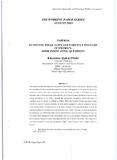Economic inequality and paretian welfare enonomics: some insinuating questions
Date
2005-08Publisher
BRAC UniversityAuthor
Elahi, Khandakar Qudrat-IMetadata
Show full item recordAbstract
This paper examines the academic soundness of the Pareto welfare criterion as a normative rule for evaluating alternative economic inequality scenarios and suggests that the criterion has several weaknesses, which wear off its usefulness: First, the Pareto principle is of limited use in the inequality debate, because labour markets hardly satisfy the conditions of perfect competition, the pivotal assumption of the theory. Second, the proposition, competitive equilibrium leads to' common good' of society, is difficult to defend. Third, the Paretian welfare economics barely answers the questions society demands, because perfect competition does not guarantee fairness in the determination of relative prices in the initial situation of income distribution. Fourth, the marginal productivity principle does not determine how, profits, the huge surpluses generated by the businesses, are distributed. Fifth, income distribution is a political issue, but Pareto's primary motivation was to alienate the distribution debate from policy and political discourses. Finally, the public earning structure is much more equitable than that of the private sector. This brings out a very serious question: which earning structure reflects improvement in social welfare: public or private?

